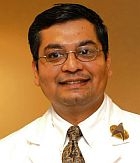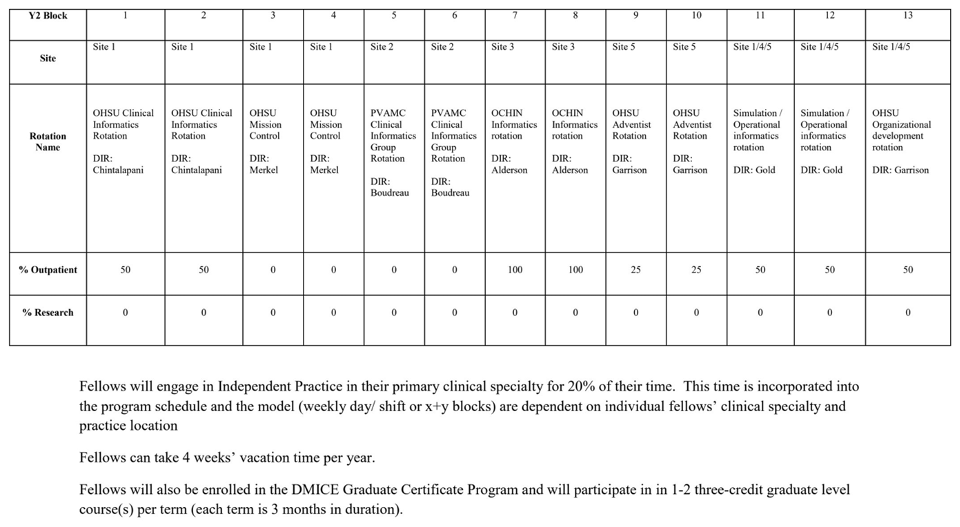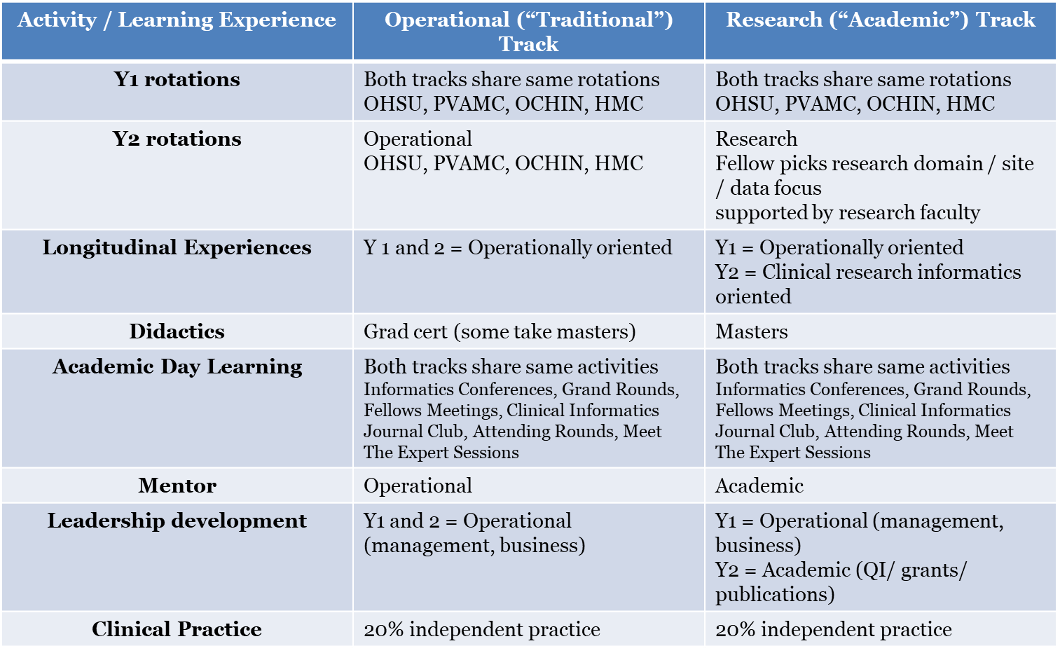Clinical Informatics Subspecialty Fellowship
OHSU Clinical Informatics Fellowship Webinar

Register for the virtual webinar on the Clinical Informatics Fellowship here when scheduled.
Program name: Oregon Health & Science University Hospital Program
Specialty: Clinical Informatics (Internal Medicine)
ACGME ID: 1394014001

The clinical informatics subspecialty program at OHSU offers a two year, full-time training experience that immerses house staff in the clinical informatics environment here at OHSU and at our partner institutions.
Fellows gain broad, in-depth knowledge of the clinical informatics operational environment, and rotate through a variety of experiences that builds their informatics competencies. They also earn a formal graduate certificate in informatics, with the opportunity to progress towards a master's degree, if they so desire.
Clinical informatics fellows are an integral part of the vibrant learning culture here at OHSU. They interact closely with operational informaticians and CI leadership, have substantial opportunities to work on operational informatics projects, conduct research, do QI, and engage in scholarly activities. They also have the opportunity to rotate at the Center for AI-Enabled Learning Health Science (CAILHS) that has been established at OHSU.
The program leverages the Biomedical Informatics Graduate Program at OHSU: all our fellows also take courses in the graduate certificate or masters program. They also have opportunities for leadership, managerial, and didactic learning while they are fellows in the program.
By the time their training is completed, our CI fellows will have received hands-on education in clinical informatics and will be prepared for a position equivalent to a medical director of informatics, and be well on their way towards becoming a leader in the field.
And of course, OHSU is located in Portland, Oregon: a vibrant city with its own unique flavor. We think that Portland is an ideal location to find both professional satisfaction and personal happiness, and we look forward to being a part of your future.
Sincerely,
Vishnu Mohan, MD MBI FACP FAMIA
Program Director, Clinical Informatics Subspecialty Program
Professor of Medical Informatics and General Internal Medicine
OHSU School of Medicine
The Accreditation Council for Graduate Medical Education (ACGME) defines clinical informatics as "the subspecialty of all medical specialties that transforms health care by analyzing, designing, implementing, and evaluating information and communication systems to improve patient care, enhance access to care, advance individual and population health outcomes, and strengthen the clinician-patient relationship."
The clinical informatics (CI) fellowship at OHSU was one of the first to be established in the nation – we took our first CI fellows in 2014. At OHSU, CI is a subspecialty of internal medicine (we are administratively governed by the IM RC at ACGME) and housed within the Department of Medicine, but we accept applicants from all medical specialties.
The fellowship provides physicians with training in clinical informatics that will enable them to achieve board certification in clinical informatics, and meet the milestones defined by ACGME. But beyond these goals, the fellowship program aims to train physicians to successfully embark on their careers as clinical informaticists, and assists them acquire the critical skills needed succeed in this career. Graduates of our programs have become informatics leaders in their organizations, and have been successful in academic and community healthcare settings, as well as in industry.
When we envisaged and deployed the fellowship program, we wanted to ensure that the framework of the program architecture rested on five fundamental pillars, namely:
- a strong focus on formal informatics training as rotations and didactics
- superior scholarly activities including research, QI projects, scheduled meetings and grand rounds
- ensuring that fellows acquire leadership skills
- allowing fellows to continue practicing in their clinical specialty to maintain their competency as physicians
- fostering an environment that balances work and life interests appropriately throughout the duration of the fellowship.
Also, OHSU has a large graduate informatics education program, and features one of the most extensive and robust informatics course catalogs in the nation. CI fellows participate in formal didactic learning with other students in the Biomedical Informatics Graduate program, with fellows from several other CI fellowship programs that also use OHSU distance learning course materials for the didactic component of their programs.
Vishnu Mohan, MD, MBI, Program Director
Lynne Schwabe, Program Coordinator
Clinical informatics rotations
Fellows rotate through a number of clinical informatics rotation at OHSU Hospital and Clinics and our partner institutions, including the Portland VA Medical Center, Hillsboro Medical Center, and OCHIN (a large health information and innovation network serving more than 10,000 clinicians). They work in different clinical informatics operational settings and play an ongoing role in designing, implementing and optimizing institutional projects. Our fellows are Epic certified physician builders and gain broad exposure to both the front end as well as back-end functionality of EpicCare at OHSU and OCHIN. At the VA they are exposed to the unique environment that allows large-scale data analytics and healthcare IT infrastructure that is nationwide in its breadth and scope.
The ultimate outcome of the clinical informatics experience is a project and leadership portfolio that allows our CI fellows to demonstrate to future employers the type and quality of work they have completed.

Program Tracks
Our program features two tracks, a “traditional” operational track, as well as an “academic” research track. Both tracks are 2 years in duration, and primarily differ in the second year of training. The operational track is the default and designed to train well-rounded clinical informaticists who are effective in the healthcare operational setting. This is best accomplished by two years of operational rotations. The research track is designed to allow trainees to gain a more detailed understanding of the informatics research environment, for careers as faculty in academic medical centers (especially if they are expected to successfully compete for extramural research funding in their field) or in any informatics career where research or research-like activities will be a primary professional focus. This is best accomplished by a focus on scientific endeavor in the second year. The research track also allows our CI fellowship training to be more easily blended with other clinical specialty training at OHSU that also feature a research year. Differences between the two tracks are detailed in the table below.

Leadership Development
Leadership development includes both formal training coupled with mentorship by informatics leaders at OHSU, the VA and OCHIN. Formal training options available to fellows include participation in leadership experiences offered by OHSU such as the Pathways to Leadership Program, training in LEAN improvement methodology, participation and leadership of rapid process improvement events and projects, and completion of the Institute for Healthcare Improvement (IHI) web-based instructional modules on quality improvement. Fellows also attend regularly scheduled clinical informatics management meetings at OHSU, informatics committee meetings, and Health Information Committee meetings.
Didactic Clinical Informatics Education
Fellows are expected to participate in learning experiences that aim to provide mastery of the core content of the field and enables them to successfully pass the clinical informatics board certification after completing the program.
The default educational experience will be the OHSU Graduate Certificate in Biomedical Informatics program, which provides which provides 21 credits of coursework (7 three-credit courses). In consultation with the program director, fellows also have the opportunity to pursue a master's degree instead of the certificate. Fellows will also have the opportunity to be involved in clinical informatics education for medical students, residents, and other clinicians. The OHSU Graduate Certificate Program provides fellows with the knowledge that prepares them for the board certification exam at the end of their fellowship. Tuition is waived for all fellows who take courses while training in the CI fellowship program at OHSU.
Formal Learning Activities
Rather than follow the traditional "noon conference" model of didactic face-to-face learning prevalent in most clinical fellowship programs, fellows participate in an "academic day" of didactic learning, including OHSU Informatics Conferences, Clinical Informatics Grand Rounds, regularly scheduled Fellows Meetings, and at the Clinical informatics Journal Club organized by the program. They also engage in the clinical informatics equivalent of a "chief of service" rounds, which offers them unique opportunities to interact with faculty. The typical academic schedule is here below.
| Time | Activity |
|---|---|
| 9:00 | Journal Club/didactic |
| 10:30 | One-on-one meeting with PD |
| 11:00 | Program meeting (all fellows, PD, program coordinator, admin) |
| 11:30 | Informatics Research Conference Clinical Informatics Grand Rounds (1st Thursday) |
| 1:00pm | PhD/Postdoc Fellows Meeting |
| 2:30pm | Meet with Faculty – “Clinical Informatics Chief of Service Rounds”; CMIO Rounds; “Meet The Expert” series; Additional F2F learning experiences |
Clinical Practice
Fellows will also be expected to maintain about 20% FTE practice in their primary clinical specialty. At OHSU, CI fellows engage in independent practice in their primary clinical specialty, i.e., work as attending physicians. The program will work with the fellow to find a suitable practice setting.
When can I apply for a CI fellowship?
We open applications a year before the start date, i.e. every July for positions starting the following July. You may begin applying to our program when ERAS opens for applications for the July application cycle.
If you are graduating from your residency program in June/July, you can apply starting July 1 of the preceding year, so the optimal time to apply is at the beginning of your final year of residency.
Do you limit applications only to candidates who are currently house staff in residency programs?
Not at all! If you are a physician who is currently in clinical practice and want to formally train to be a clinical informatician, as long as you are board-certified in your clinical specialty and have completed your residency from an ACGME-approved training program, you are most welcome to apply too!
How do I apply to your program?
We participate in the Electronic Residency Application Service (ERAS), and accept all applications only through ERAS. We are listed under MD Fellowship –July Cycle >Clinical Informatics (Internal Medicine). Our ACGME ID is 1394014001.
Does your program participate in the National Resident Matching Program (NRMP)?
No. CI programs participate in their own match, which is hosted by the American Medical informatics Association. More about the AMIA CI match at
https://amia.org/membership/academic-forum/amia-clinical-informatics-fellowship-match
I'm an international medical graduate. Can I apply to your program?
Yes, if you are board-eligible or certified in a primary specialty and completed your residency program from an ACGME-accredited residency program.
What is your admission process?
We have a CI fellowship admission committee that decides who to admit to the fellowship program. Committee members start reviewing applications in July and decide who to bring in for interviews. Once the interviews are complete, the committee meets to rank applicants. We participate in the AMIA Clinical Informatics Fellowship Match
How many interview days do you have each year?
The logistics associated with organizing an interview are typically more complex than those involved with organizing a clinical specialty interview, because we want applicants to meet not only with program leadership but also with our faculty who are scattered across Portland. Since 2020, these interviews have been virtual.
Also we want candidates to connect with folks from their clinical specialty, and since we accept candidates from all clinical specialties, organizing meetings with relevant clinical faculty can become complicated very quickly. Additionally, candidates may want to meet with specific OHSU faculty whose work they are interested in, and we try to accommodate their requests.
We start the interview planning process early in the recruitment year, and plan on a total of 3-4 interview days between August and December.
What I am trying to say in a somewhat long-winded way is that we will need more lead time to schedule your interview than a typical clinical fellowship program would, so apply early to make sure we can accommodate you if the admission committee approves to invite you for an interview!
What can I expect if I interview at OHSU?
You will meet with program leadership and then expect to be interviewed by a bunch of informatics faculty. You will also connect with clinical faculty so that you get a sense of the folks you will be working with to fulfill your clinical practice requirements. If there are academic or learning activities on the day you interview, you are welcome to join us! At the end of the day you get to hang out with our current fellows, and then you are done with the interview. It's a busy and long day, but then which fellowship interview isn't?
What benefits am I eligible for as a fellow at OHSU?
CI fellows are full time GME house staff at OHSU. Details of house staff benefits are at
https://www.ohsu.edu/school-of-medicine/graduate-medical-education/employment-and-benefits
I already have some CI experience, can I be "grandfathered" into CI board certification?
If you think you already meet the requirements for taking the CI board exams, you should contact the American Board of Preventive Medicine (ABPM) to see if you are eligible. If you are not eligible for grandfathering, the only way to become board certified in clinical informatics is to complete the 2-year fellowship.
My primary specialty board certification has lapsed. Can I still apply for your program?
CI requires diplomates to maintain their primary specialty board certification. If you are ineligible for board certification in your primary specialty, or your certification has lapsed, we urge you to contact us before applying so that we can determine if you are eligible.
I'm a resident at an ACGME-accredited program in the US. Can I do a clinical informatics rotation / elective at OHSU?
We do have opportunities for residents to do an "away" CI rotation at OHSU. However, unlike clinical electives, the CI rotation tends to be bespoke, and individualized to the resident's needs. If you wish to come to OHSU for a CI rotation during your residency, please contact Lynne Schwabe at schwabel@ohsu.edu so that we can determine how best to meet your learning goals.
I'm a medical student at a school in the US. Can I do a clinical informatics rotation / elective at OHSU?
CI rotation opportunities for non-OHSU medical students are limited. Please contact Lynne Schwabe at schwabel@ohsu.edu to inquire about your options.
I'm a resident / medical student at an international medical institution. Can I do a clinical informatics rotation / elective at OHSU?
At this time, we do not have the process for international rotations set up.
Is Portland really like how it is portrayed in "Portlandia"?
The short answer is "yes". The long answer is that Portland is a very unique place to live. There are a multitude of things to do, both outdoors and indoors. Want to spend the day at the beach? It's just an hour or two away. The mountains? Ditto. Visit a volcano? Sure. Hike the gorgeous Columbia Gorge? Yep. Take a cable car to work? Why not, it's a free ride with your OHSU ID. Whether you are into arts and culture, microbrews, the great outdoors, eclectic cuisine, bicycling, sustaining the environment, Magic the Gathering, geocaching, good coffee, or you are just looking for a place where you can flourish, then Portland should probably be on your shortlist of "best places to live". Even during the winter, when it rains incessantly. But the summers more than make up for it.
